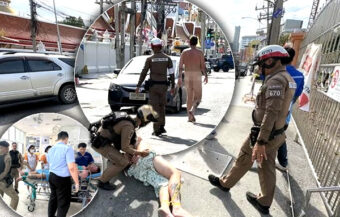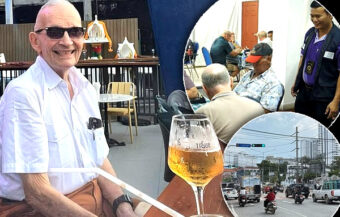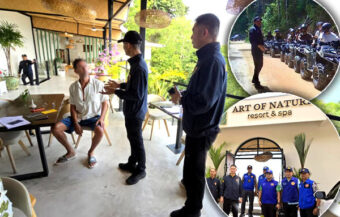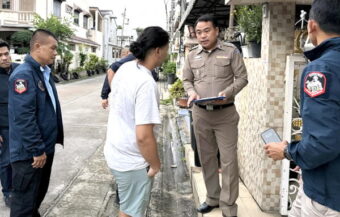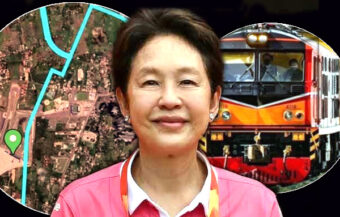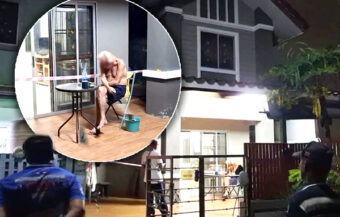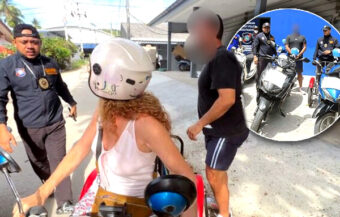A UK man who moved to Thailand when his wife was first diagnosed with oncoming Alzheimer’s, speaks positively about the kingdom which still offers a life ‘in paradise’ to many elderly foreigners with income who seek to retire in stark comparison to life in a nursing home where many residents spend 23 hours locked in a room on a daily basis.
An elderly French man was rescued by local volunteers and the Royal Thai Police last Friday after he had gone missing for over 24 hours. The foreign retiree, living in Thailand, it was revealed, suffers from Alzheimer’s which played a part in his misadventure. The story is not unusual. It highlights the growing number of western retirees living in Thailand with dementia and how the kingdom has become a hub for western nationals and their families seeking an alternative to the nursing home care sector in western countries where many residents receive a paucity of care in drab and overcrowded conditions.
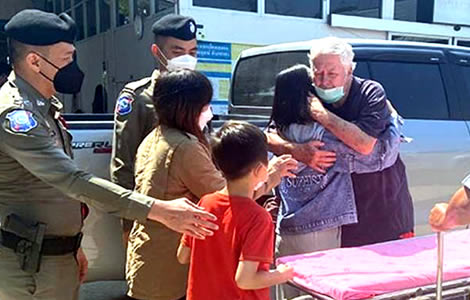
A 72 year old French national was found alive and well by a team of police officers, volunteers and local officials on Friday last after he was reported missing by his Thai wife.
Jacques Moriceau, who suffers from Alzheimer’s disease, is understood to have lost his way after visiting the French consulate in Chiang Mai to submit official documents early on Thursday.
Tearful reunion between Frenchman and Thai wife at a medical facility in Chiang Mai’s Doi Tao district
Police Lieutenant Colonel Mokkara Srisakunpisut, an Inspector with the Chiang Mai Tourist Police, briefed the press after a tearful reunion occurred between Mr Moriceau and his Thai spouse at a local medical facility.
The Frenchman had left his home on Thursday morning but appears to have lost his way home after visiting the consulate in the centre of Chiang Mai when he became disorientated on the road in the Hang Dong district, to the south of the city.
It appears the Frenchman ended up further south in the Doi Tao district of the province.
Police have explained that they believed the man travelled 100km away from the area where he lived before his pickup got stuck in a forested area near Doi Tao lake.
Police alerted on Friday after he was missing for 24 hours, found him 100 km away at a remote mountain top temple after his car got stuck in a forested area
On Thursday afternoon, his wife and other relatives found they could not make contact with Mr Moriceau.
They decided to alert the police on Friday afternoon at 12.30 pm after he had still failed to return home at that point.
The police assembled an experienced team of officers and local leaders in the province to launch a search for the elderly and vulnerable man.
He was found at a deserted temple on a hilltop in Doi Tao later in the day.
Apart from appearing extremely tired and exhausted, the foreigner did not appear to be injured but was taken to Doi Tao Hospital for a checkup where he was reunited with his wife and family.
Police had been led to Doi Tao after they detected the last ping from the French man’s smartphone in that area.
The temple where he was found, Wat Phrathat Chomsawan, is on a route approximately one hour from the main road.
Mr Moriceau explained to the police how he had lost his way and thanked them for coming to his rescue as well as the many local people who took part in the successful operation.
Police Lieutenant Colonel Mokkara disclosed that the French man has lived in Thailand’s picturesque northern province for 10 years with his Thai wife.
Such rescue operations not uncommon in Thailand
Such rescue operations have become quite common in recent years across Thailand due to the kingdom’s growing elderly population of western men.
Thailand and particularly Chiang Mai is a popular area for elderly foreigners seeking to retire. This is especially so for people who need Alzheimer’s care.
The prevalence of the disease in western countries and the spiralling cost of nursing home care has led many western families and individuals to choose Thailand as a very attractive option for elderly people seeking an enhanced mode of living and superior care.
The disease is prevalent in adults over 60 years of age with a worldwide figure of 3.9% which increases to 5.6% in western Europe and 6.4% in North America.
Prior to the endemic explosive growth in elderly foreigners moving to Thailand with dementia
Prior to the COVID-19 pandemic, there was an explosive growth in western people migrating to Thailand with the condition and other forms of dementia, seeking better and more moderately priced care in Thai nursing homes and more particularly in Chiang Mai.
‘Thailand already has a long history of medical tourism and it’s now setting itself up as an international hub for dementia care,’ said Dr Caleb Johnston of Newcastle University to the UK’s Daily Telegraph before the COVID-19 emergency in 2020 after he had identified the trend and travelled to Thailand to research it.
The human geography lecturer, along with Professor Geraldine Platt, also working with Newcastle University, had just spent 9 weeks in Thailand interviewing UK nationals with dementia-related illnesses and their families who had moved to northern Thailand seeking care and a better lifestyle.
Moved to Thailand for better care, life quality and lower costs than the UK where 850,000 suffer from dementia-related illness. In the US, it’s 5.8 million
They had moved to Thailand for the lower cost structure in the kingdom and the higher standards of care.
In comparison, UK care facilities have a higher ratio of patients to staff, as high as six to one with over 120,000 job vacancies at any time in the sector, aggravating the situation, as the already overburdened industry struggles to find staff.
There are reported to be over 850,000 people in the United Kingdom alone suffering from dementia with many needing care in expensive nursing homes and facilities.
The number in the United States is 5.8 million with 97% of these over 65 years of age.
Growing emergency in western countries
This growing emergency in western countries could mean more people migrating to Thailand although the kingdom itself is also beginning to suffer from an ageing crisis of its own which is somewhat offset by the country’s unique culture which relies less on institutional care and a more respectful attitude towards the elderly.
Cabinet in pension move as the number of working Thais to over 60s is set to half in 20 years
‘There aren’t yet any official numbers as to how many people are moving out to Thailand to receive care,’ explained Dr Johnston in the UK. ‘Relative to the total number of people living with dementia, it is a low number. But with the number of people with dementia set to increase, and the cost of looking after them also getting higher, it is likely to be an option that more and more people consider.’
The movement to Thailand by retirees is not confined to those seeking treatment in nursing homes although it sometimes becomes an option at a later stage for people suffering from dementia.
Thailand, over the past six decades, has emerged as a ‘paradise’ retirement option for retirees with income
Over the last sixty years, Thailand has been a favoured retirement destination, something that has grown exponentially in the last two decades due to the internet and a more comprehensive flight network.
In 2010, the Finnish government even proposed a scheme to build and subsidise homes in Thailand for its retirees and provided information suggesting that the cost of housing its elderly in the kingdom, on a daily basis, would be only 32% of the comparable cost in Finland.
Many older people, on first moving to Thailand, describe their experience as ‘living in paradise’ when writing home on social media.
So, for example, says 71-year old Peter Bowen who moved to live by the beach in Phuket in 2009 with an income of $2,500 a month on what he considered to be declining employment opportunities.
‘My adult children had left, and I wasn’t in a relationship,’ he explained in 2021. ‘I decided to throw the dice.’
UK resort operator opened a care home in Chiang Mai in 2014 after becoming disillusioned with nursing homes at home and the care offered to his mother
In 2009 also, Peter Browne, a UK businessman, moved to Chiang Mai to open a four-star holiday resort.
Five years later, in 2014, he established a care resort for the elderly after he found he was unhappy with the care being offered by residential nursing homes to his mother living in the United Kingdom.
‘I don’t believe there are any relatives in the world who want to export their mother and father to a different country,’ he disclosed. ‘What they want is care for their mother and father that they are entitled to and unfortunately, their local city is incapable of giving them.’
Mr Browne believes that the modern western lifestyle and culture is unconducive to the treatment and care of dementia sufferers.
He believes that the more relaxed lifestyle in Thailand, lower cost of living and family centred culture is particularly suited to caring for the elderly in their retirement years and, even more so, for those with conditions such as Alzheimer’s.
He said the alternative was letting a loved one spend 23 hours locked away in a room daily compared to a superior experience in Thailand which many UK people are beginning to explore.
Pandemic disrupted and even reversed the trend
The attraction of Thailand as a care centre for elderly people with dementia has, of course, been disrupted and in some instances, reversed by the pandemic over the last two years or so.
There have also been real problems with unintended consequences caused by changes to immigration regulations as authorities in the kingdom have attempted to regularise the large immigrant western community that has built up in Thailand over the decades.
Thai authorities still advertise the kingdom to prospective retirees even as regulations are being tightened due to the growth of the expat population
While Thai authorities have been anxious to assert that government policy still favours the trend and have moved to correct unintended problems, there have been high profile cases where foreigners have been forced to move elderly relatives to the Philippines where the rules are more flexible.
In addition, there has been a rise in the cost of living in Thailand but this is muted by the fact that inflationary pressures in the kingdom have been somewhat less than those seen over the last few months in western countries.
Wealthy foreigners to own small landholdings associated with homes here agreed in principle
Thailand is currently involved in a push to attract high net worth foreign residents including retirees with a target to have 1 million wealthy foreigners living in the kingdom by 2027 contributing over 10% of the country’s GDP, quite apart from tourism.
UK man who moved to Thailand in 2016 when his wife was diagnosed with the onset Alzheimers speaks very warmly of the kingdom and its caring people
Allan Sims, from the South of England, had been to Thailand years before with his wife on holidays but in 2016 the couple moved to the country to live permanently after doctors confirmed that she had begun to develop Alzheimer’s.
The couple first settled in Ko Samui and lived happily in a four-star hotel.
When, subsequently, his wife’s condition worsened, with the help of his daughter, he found a care home in Chiang Mai.
He speaks movingly about the care and respect shown to his wife and his family in Thailand.
‘I’m so impressed. My wife needs someone with her 24/7. When I get overwhelmed and my daughter takes me away for a break, a carer doesn’t just care for my wife but shares the bed with her,’ he says, explaining that his wife has a problem where she gets up and walks about. ‘If I was in the UK, we might get a carer for 15 minutes in the morning and 15 minutes in the evening, or some ridiculous thing, I despair about the care in the UK.’
Join the Thai News forum, follow Thai Examiner on Facebook here
Receive all our stories as they come out on Telegram here
Follow Thai Examiner here
Further reading:
Change in insurance rules for retirement visas after some over 70s were forced out of Thailand
Wealthy foreigners to own small landholdings associated with homes here agreed in principle
New health insurance regime for retirees living in Thailand means foreign firms can provide cover
New plan for the Thai economy could see an elite foreign visa scheme generate up to 6% of GDP
New money for residency scheme may go live in January 2022 says government spokeswoman
Economic plan to put the smile back in Thailand’s appeal to western foreigners to live and work
Deputy Public Health Minister leaves expats confused with ‘over 50s’ visa insurance press comments
Thai Ministry of Health brings in tiered pricing for medical services to foreigners and tourists
50-year-old Dutchman suffering from cancer files complaint against Hua Hin hospital over fees
Battlefield friends help UK man and wife escape medical bill of £12k in Thailand. Now safely home
New health coverage proposals for foreigners in Thailand a concern for those with medical conditions
Visa amnesty finally ending but the new regime is pragmatic and may allow for further renewals
Visa amnesty to be retrospectively extended to October 31st says top Immigration Bureau officer

